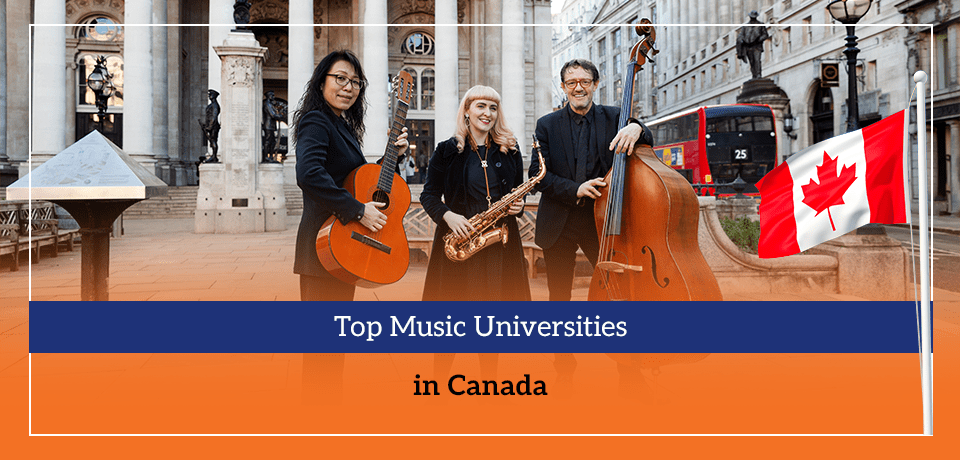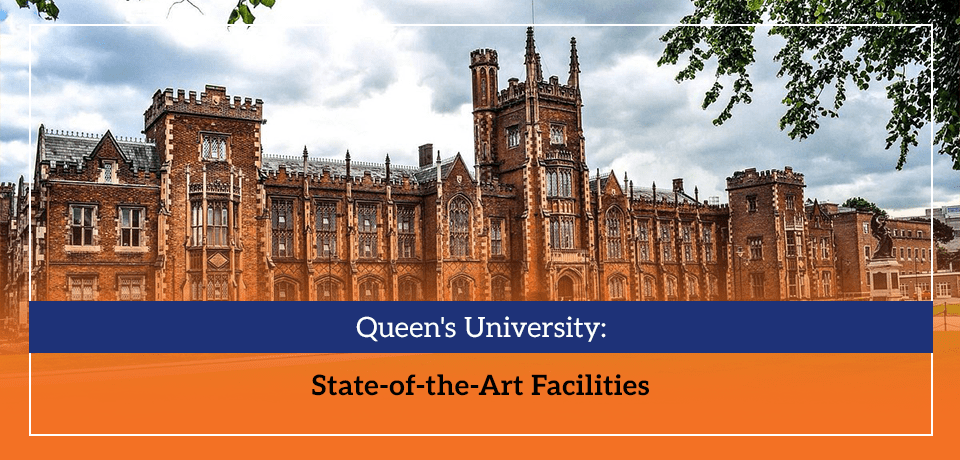Did you know that Canada consistently ranks among the world's leading countries in terms of quality of music education?
The best music universities in Canada offer degrees ranging from the Bachelor of Music to Master of Music programs, and even a Doctor of Musical Arts. Are you finding it challenging to follow Canada's diverse music programs and complex admission processes as an international student? You're not alone. This guide explains various music degrees, lists top schools, and shares details like admission requirements, scholarships, and career paths. It will help you choose a school that fits your dreams and goals.
By the end of this article, you'll have clear, practical insights to help you select a university that will launch your global musical career.
What Will You Learn in This Guide?
- Top music universities in Canada and their strengths
- How to compare different music programs
- Admission requirements specifically for international students
- Scholarship opportunities and how to apply for them
- Career options after graduation
- Step-by-step application process
Why Study Music in Canada?
How does Canada stand out in global music education?
Canada excels as a leader in music education for three main reasons:
- International Recognition: Canadian music degrees are respected worldwide, strengthening your resume and improving your job prospects.
- Diverse Cultural Influences: The mix of different cultures and vibrant art scenes on Canadian campuses helps develop your creativity and expands your artistic perspective.
- Practical Opportunities: Scholarships, work permits after graduation, and strong connections with music industry companies help students move smoothly into professional careers. For those seeking cost-effective education options, many institutions balance quality with affordability, making Canada an attractive choice for budget-conscious international students.
Red Flags vs. Green Flags
|
Red Flags to Avoid
|
Green Flags to Look For
|
|
✗ Outdated equipment and facilities
|
✓ Modern studios and recording spaces
|
|
✗ Limited performance opportunities
|
✓ Regular concerts and performances
|
|
✗ Few industry connections
|
✓ Active alumni networks
|
|
✗ Narrow program focus
|
✓ Real-world industry exposure
|
This combination of academic excellence and creative support makes Canada an ideal destination for aspiring musicians. It offers both theoretical knowledge and practical experience that prepare you for professional work.
Understanding Music Degrees in Canada
Did you know that 88.6% of international students who graduated from Canadian institutions in 2020 secured employment within three years?
Types of Music Programs Available
Undergraduate Programs (4 years)
- Bachelor of Music (B.Mus): Focuses on performance, composition, or music education
- Combined Degrees: Music plus Arts, Business, or Computer Science
Graduate Programs
- Master of Music (M.Mus): 2-year program for advanced skills in performance or research
- Doctor of Musical Arts (D.M.A.): 3-5 year research program for academic careers
Short-Term Programs
- Artist Diplomas: Quick training for performers
- Performance Certificates: Programs focused on technical skills

Top 7 Music Universities in Canada 2026
- University of Toronto
- McGill University
- University of British Columbia
- Concordia University
- Queen's University
- York University
- Wilfrid Laurier University
Here are some of the top Canadian music schools, many publicly funded institutions renowned for academic excellence, offering excellent programs and great opportunities in detail.
University of Toronto: Global Music Excellence
Have you ever wondered where many famous Canadian musicians studied?
The University of Toronto ranks among the top 25 music schools globally, producing over 40 Grammy and Juno award winners. With a legacy of over 100 years, this institution offers rigorous classical training and contemporary programs.
The Faculty of Music is housed in the historic Edward Johnson Building, which underwent a $25 million renovation in 2016 to modernise its facilities while preserving its acoustic excellence. International students benefit from Toronto's position as Canada's music industry hub, with major record labels, orchestras, and production companies within reach.
Key Facts:
- Student-to-Teacher Ratio: 12:1
- International Tuition: Approximately $58,000 CAD
- Ranked #23 globally for Performing Arts (QS 2025)
Program Strengths:
- Strong performance, composition, and music education programs
- 85% doctoral program completion rate
- Over 100 practice rooms with high-quality Steinway pianos
Career Outcomes:
- 78% of graduates find music-related jobs within one year
- Average starting salary: $52,000 CAD
- Alumni perform in major orchestras and recording studios
For International Students:
- A diverse campus with various housing options
- Higher living costs than in other Canadian cities
McGill University: Excellence in Music Education
Why do so many international musicians choose Montreal for their education?
McGill University, ranked 31st globally for performing arts, is Canada's largest university-based music school. The Schulich School of Music received a transformative $20 million donation in 2005, enabling significant facility upgrades and expanded scholarship programs.
The school's early music program features one of North America's largest collections of period instruments, including harpsichords, baroque violins, and violas da gamba. Montreal's designation as a UNESCO City of Music creates a vibrant environment where students can experience everything from jazz festivals to symphony performances throughout the year.
Key Facts:
- Student-to-Teacher Ratio: 10:1
- International Tuition: Approximately $45,000 CAD
- Ranked #29 globally for Performing Arts (QS 2025)
Program Strengths:
- Outstanding jazz studies program
- Focus on music technology and innovation
- Early music specialisation with historical instruments
- Bilingual learning environment (English and French)
Career Outcomes:
- 82% of graduates find professional music positions within one year
- Alumni work with prestigious organisations worldwide
For International Students:
- Housing costs: $800-1,500 CAD monthly in Montreal
- Health insurance: approximately $900 CAD yearly
- Lower cost of living than Toronto
University of British Columbia: Asia-Pacific Music Studies
How does UBC's location shape its unique approach to music education?
UBC, ranked 40th globally for performing arts, offers a gateway between Eastern and Western musical traditions, benefiting Vancouver's position as Canada's gateway to Asia.
The School of Music's ethnomusicology department houses Canada's largest collection of non-Western instruments, including complete gamelans, Chinese orchestral instruments, and Japanese taiko drums. UBC's partnership with the Vancouver Symphony Orchestra provides students with mentorship opportunities and practical orchestral training.
The school's spectacular Chan Centre for the Performing Arts features world-class acoustics designed by the same team behind the Sydney Opera House.
Key Facts:
- Student-to-Teacher Ratio: 15:1
- International Tuition: Approximately $53,000 CAD
- Ranked #38 globally for Performing Arts (QS 2025)
Program Strengths:
- Focus on ethnomusicology (study of world music)
- Asia-Pacific musical traditions
- Strong recording and production facilities
Career Outcomes:
- 80% employment in music and creative industries within one year
- Graduates work at the Vancouver Symphony Orchestra and CBC Radio
For International Students:
- Housing costs: $1,000-1,800 CAD monthly in Vancouver
- Health insurance: approximately $950 CAD yearly
- Mild climate with excellent public transportation
Concordia University: Electronic Music Innovation
What makes Montreal a global hub for electronic music education?
Concordia University is renowned for its specialisation in electronic music and groundbreaking work in electroacoustic studies. The Department of Music's electroacoustic studios were established in 1971, making them among the oldest in North America.
Their state-of-the-art spatial audio systems allow students to create immersive sound environments using 32-channel speaker arrays. Montreal's thriving electronic music scene, home to international festivals like MUTEK, provides students with real-world venues to showcase their experimental works and connect with industry professionals from around the globe.
Key Facts:
- Student-to-Teacher Ratio: 14:1
- International Tuition: Approximately $30,000 CAD (most affordable)
- Ranked #415 globally (QS 2025)
Program Strengths:
- Leader in electroacoustic studies
- Modern electronic music studios
- Digital sound design with hands-on training
Career Outcomes:
- 75% employment in technical audio fields within one year
- Graduates work in game audio, film sound, and virtual reality
For International Students:
- Housing costs: $700-1,300 CAD monthly in Montreal
- Health insurance: approximately $900 CAD yearly
- Vibrant multicultural environment

Queen's University: State-of-the-Art Facilities
How does a smaller university deliver world-class music education?
Queen's University is celebrated for its exceptional facilities, notably the historic $72 million Isabel Bader Centre for the Performing Arts, which opened in 2014. This waterfront facility includes a 566-seat concert hall, a studio theatre, and a film screening room designed by the renowned architectural firm Snøhetta. The intimate program size (typically fewer than 20 students per graduating class) ensures personalised attention and mentorship opportunities unavailable at larger institutions.
Queen's unique Indigenous Studies in Music program works closely with local communities to preserve and celebrate First Nations musical traditions.
Key Facts:
- Student-to-Teacher Ratio: 11:1
- International Tuition: Approximately $45,000 CAD
- Ranked #193 globally (QS 2025)
Program Strengths:
- Professional-grade recording arts program
- Indigenous Studies in Music programs
- Personalised instruction in small classes
Career Outcomes:
- 80% success rate in music-related employment within one year
- Graduates work in orchestras, audio engineering, and entrepreneurship
For International Students:
- Housing costs: $700-1,200 CAD monthly in Kingston
- Health insurance: approximately $900 CAD yearly
- Lower cost of living than major cities
York University: Digital Music Innovation
What makes York a leader in music technology education?
York University stands out for its leadership in digital innovation and extensive ethnomusicology collections. The DisPerSion Lab is a leading research centre for interactive performance technologies, virtual reality applications in music, and digital media composition.
York houses Canada's largest ethnomusicology collection with over 3,000 instruments from around the world and extensive archives of field recordings. The Digital Media program uniquely combines traditional music theory with computer programming, preparing students for emerging careers that didn't exist a decade ago.
In Canada's largest city, York offers unparalleled access to Toronto's thriving music technology industry.
Key Facts:
- Student-to-Teacher Ratio: 13:1
- International Tuition: Approximately $40,000 CAD
- ● Ranked #184 globally (QS 2025)
Program Strengths:
- Largest ethnomusicology collection in Canada
- DisPerSion Lab for cutting-edge performance technologies
- A combination of traditional music with modern digital innovation
Career Outcomes:
- 70% placement in media production within one year
- Graduates work in film scoring, game audio, and interactive sound
For International Students:
- Housing costs: $800-1,500 CAD monthly near Toronto
- Health insurance: approximately $900 CAD yearly
- Close to Toronto's media industry for networking
Wilfrid Laurier University: Innovative Music Education & Community Engagement
What makes Laurier a leader in innovative music education?
Wilfrid Laurier University is celebrated for its forward-thinking approach to music education, blending specialised training with a collaborative, community-focused environment. Laurier offers comprehensive composition, performance, and music education programs, and its pioneering music therapy initiatives provide an innovative edge. The university also boasts renowned ensembles, including the celebrated Penderecki String Quartet, offering students real-world performance opportunities that build technical skill and confidence.
Key Facts:
- Student-to-Teacher Ratio: 25:1
- International Tuition: Approximately $33,200 CAD
- Global QS Ranking (2025): #175
Program Strengths:
- Wide range of specialisations in composition, performance, and music education
- Innovative music therapy initiatives that prepare students for emerging roles
- Renowned ensembles like the Penderecki String Quartet, enhancing performance skills
- A collaborative environment that emphasises community engagement and interdisciplinary learning
Career Outcomes:
- Graduates pursue diverse careers as performers, composers, music educators, and music therapists
- Strong community networks lead to extensive collaboration opportunities and industry connections
- Alumni have successful careers across creative industries, research, and therapeutic arts
For International Students:
- Housing costs: Approximately $700–1,200 CAD per month in Waterloo
- Health insurance: Approximately $900 CAD per year
- Access to extensive support services, including career counselling and community engagement programs, to facilitate networking and integration into the local music industry
Comparison of Top Music Schools
Which school best matches your musical goals?
Below is a comparative table to help you evaluate these institutions based on key metrics:
|
University
|
Special Programs
|
Tuition (CAD)
|
Teacher Ratio
|
Global QS Ranking (2025)
|
|
University of Toronto
|
Performance, Composition, Music Education, Music Theory & History, Interdisciplinary Studies
|
~$58,000
|
12:1
|
#23
|
|
McGill University
|
Jazz Studies, Early Music, Contemporary Music, Music Technology & Innovation
|
~$45,000
|
10:1
|
#29
|
|
University of British Columbia (UBC)
|
Ethnomusicology, Asia-Pacific Music Traditions, Orchestral Training, Opera Studies
|
~$53,000
|
15:1
|
#38
|
|
Concordia University
|
Electronic Music, Electroacoustic Studies, Digital Sound Design, Contemporary Music Production
|
~$30,000
|
14:1
|
#415
|
|
Queen's University
|
Recording Arts, Indigenous Studies in Music, Music Theory & Composition, Media & Sound Production
|
~$45,000
|
11:1
|
#193
|
|
York University
|
Digital Media, Ethnomusicology, World Music, Jazz & Contemporary Music, Interdisciplinary Arts
|
~$40,000
|
13:1
|
#184
|
|
Wilfrid Laurier University
|
Composition, Performance, Music Education, Music Therapy Initiatives, Community Engagement
|
~$33,220
|
25:1
|
#175
|
Note: Always check each university’s website for the most current information.
Do you know this Surprising Fact:
The University of Toronto has produced over 40 Grammy and Juno award winners, a testament to its high-calibre performance and industry connections.
Context to Consider:
- Special Programs: Look closely at the range of specialised programs. For example, if you’re interested in innovative digital production or blending traditional and modern musical techniques, compare programs like York’s Digital Media and Concordia’s Electronic Music.
- Cost and Ratio: Tuition fees and teacher-to-student ratios can impact the level of personal attention you receive.
- Global Ranking: QS rankings provide a snapshot of global reputation; higher rankings often correlate with better research facilities and industry networks.

Admission Requirements for International Students
What do you need to prepare for your application?
When applying to Canadian music schools, international students must meet several key criteria:
Academic Requirements:
- Undergraduate Programs: You must have a high school diploma.
- Graduate Programs: A bachelor’s degree in music (or a related field) is required.
Music Requirements:
- Audition Video: Prepare a 15–20 minute video demonstrating your technical skill and artistic expression.
- Portfolio/Work Samples: For composition programs, include your best compositions; for technology-focused programs, include relevant examples.
Language Requirements:
Additional Materials:
- Recommendation Letters: Obtain letters from teachers or music professionals who can speak to your musical abilities.
- Personal Statement: Write about your artistic goals and why you’re an ideal candidate.
Tip: Use phrases like “My artistic philosophy centers on…” to create a memorable statement.
- Interviews: Some schools require interviews (either in-person or online).
Scholarships and Financial Aid
How can you fund your music education in Canada?
Here are some scholarship options to consider -
University Scholarships:
- University of Toronto: President's Scholars
- McGill: Merit Awards
Government Scholarships:
- Vanier Canada Graduate Scholarships: Up to $50,000 annually for doctoral students.
- Additional Grants: Available through the Government of Canada Scholarship Portal.
Application Tips:
- Start Early: Begin scholarship applications at least 6 months before deadlines.
- Quality Matters: Make sure your audition video and portfolio are of high quality.
- Research Requirements: Look up each university’s specific scholarship criteria.
- Strong Personal Statement: Clearly explain why you deserve financial support.
Quick Tip: EduCanada provides useful links for funding opportunities.

Career Prospects After Graduation
What jobs can you get with a Canadian music degree?
A degree from one of the best music universities in Canada can open many career paths. For those aiming to build a life in Canada, pairing your music studies with PR-focused academic programs can strengthen your post-graduation residency prospects.
Performance Careers:
- Job Roles: Soloists, ensemble members, and orchestral performers.
- Starting Salaries: Typically between $52,000 and $68,000 CAD.
Creative and Technical Roles:
- Job Roles: Film scoring, sound engineering, digital production.
- Salaries: Often exceed $75,000 CAD.
Academic Careers:
- Job Roles: Music teachers, university professors, researchers.
Therapeutic Careers:
- Wilfrid Laurier University Options:
Bachelor of Music Therapy (BMT): Ontario's only undergraduate music therapy degree.
Master of Music Therapy (MMT): Canada’s longest-running graduate program in music therapy, offering comprehensive clinical and theoretical training.
Career Checklist:
- Build your network through internships.
- Attend workshops and industry events.
- Use university job boards to explore opportunities.
- Connect with alumni in your chosen field.
- Create a professional portfolio website.
Student Life and Campus Experience
What is daily life like at Canadian music universities?
Campus Facilities:
- Practice Rooms: Modern, well-equipped rooms with professional pianos.
- Recording Studios: Facilities designed for both live and digital recording.
- Libraries: Extensive music collections and digital media resources.
- Performance Venues: Concert halls and recital spaces are available for student performances.
Student Activities:
- Ensembles and Choirs: Participate in a variety of musical groups.
- Masterclasses and Workshops: Learn from visiting artists and industry professionals.
- Cultural Events: Engage in events that enhance your academic and artistic experiences.
Support Services:
- Orientation Programs: Tailored for new international students.
- Academic Advising: Assistance with course selection and academic planning.
- Career Counselling: Support for internships and job opportunities.
- Language Support Programs: Resources to improve academic English skills.
Visual Tip: Watch virtual campus tours on university websites to get a real sense of the facilities and community.
Application Process and Deadlines
Follow these steps to apply to Canadian music universities:
Step 1: Research Programs (6–12 Months Before Application)
- Identify Your Goals: Review the comparison table to choose programs that align with your musical interests and career plans.
- Gather Information: Visit each university’s website to verify program details, updated QS rankings, tuition fees, and any specific admission requirements.
Step 2: Prepare Your Documents (3–6 Months Before Deadline)
- Collect Transcripts: Ensure you have all academic records and certificates.
- Request Recommendation Letters: Contact teachers or music professionals early.
- Record Your Audition Video: Create a high-quality 15–20 minute video showcasing your skills.
- Write Your Personal Statement: Clearly articulate your artistic vision and career aspirations.
- Assemble Your Portfolio: Organise your best compositions, recordings, or performance clips into a professional format.
Step 3: Submit Applications
- Follow Deadlines: Some schools require audition submissions by December 1, and the final documents are due by May 30.
- Apply to Multiple Schools: Diversify your applications to improve your chances of admission.
Step 4: Follow Up
- Interview Preparation: Practice answering questions about your musical background and goals.
- Check Your Application Status: Log in to your application portal regularly.
- Respond Promptly: Address any additional requests or requirements as they arise.
Pro Tip: Use a checklist and a calendar to keep track of all your documents, deadlines, and steps in the process.

Frequently Asked Questions
What are the top music schools in Canada?
Canada hosts many top Canadian music schools, such as the University of Toronto Faculty of Music, McGill University Schulich School of Music, and UBC School of Music. These schools offer programs ranging from a Bachelor of Music in Canada to advanced degrees like Master of Music programs in Canada.
What are the admission requirements for music degrees in Canada?
You need a high school diploma for undergraduate programs or a bachelor’s degree for graduate studies. Applicants must provide transcripts, audition recordings, language test scores like IELTS or TOEFL, letters of recommendation, and personal statements.
How much does it cost to study music in Canada?
International students can expect tuition fees for music programs in Canada to be between CAD 30,000 and CAD 60,000 per year, not including living costs. Always check the latest numbers on each university’s website.
What scholarships are available for music students in Canada?
There are many scholarships for music students in Canada, including merit-based awards and need-based bursaries. Both universities and the Canadian government offer financial support.
What career opportunities are available after graduating from Canadian music universities?
Graduates can work as performers, composers, educators, music therapists, or sound engineers. Many also work in research or start their own studios. Canadian music degrees lead to strong career prospects for music graduates in Canada.
Which universities offer the best programs in music performance?
The University of Toronto, McGill, and UBC are renowned for their exceptional music performance degrees in Canada, boasting top-notch facilities and experienced faculty.
How competitive is admission to Canadian music schools?
Admission is very competitive. You must show excellent musical talent, strong academic records, and successful audition performances.
What facilities do Canadian music schools offer?
These schools provide modern practice rooms, recording studios, concert halls, and extensive music libraries to support your learning and performance.
Are there special opportunities for international students?
Yes, international students receive help through orientation programs, academic advising, and special scholarship opportunities.
Do Canadian music schools offer music therapy programs?
Some schools, like Wilfrid Laurier University, offer specialised music therapy programs in Canada that train students for clinical work.
Conclusion
Studying music in Canada gives you a great chance to learn and grow. Indeed, Canada offers exceptional opportunities for music education with diverse program options, modern facilities, and strong career prospects (as reported in 2025). Additionally, Schools offer various programs, such as the Bachelor of Music in Canada and the Doctor of Musical Arts in Canada. Sounds good, right?
And the best part?
Whether your passion lies in performance, composition, digital sound innovation, or music therapy, Canadian music universities combine rigorous academic training with real-world experience to help you launch a successful global career.
How to Apply This Knowledge
Action Steps for a Successful Application:
Step 1: Review Your Options
- Task: Refer to the comparison table to identify the universities and programs that best match your musical goals.
- Time Estimate: 2–3 hours.
- Surprising Fact: Did you know that McGill’s Schulich School of Music is among the largest music schools in Canada, offering an inspiring mix of traditional and modern music programs?
Step 2: Create an Application Timeline
- Task: Build a detailed schedule with all required documents (transcripts, recommendation letters, audition video, personal statement) and mark all deadlines.
- Time Estimate: 1 hour.
- Tip: Use a calendar or checklist to keep organised.
Step 3: Prepare Your Audition
- Task: Record and edit a high-quality 15–20 minute audition video demonstrating your musical skills.
- Time Estimate: 3–4 weeks.
- Tip: Practice and review your video several times, ensuring your performance is polished.
Step 4: Strengthen Your Personal Statement
- Task: Write a clear personal statement that outlines your artistic philosophy and career aspirations.
- Time Estimate: 1–2 weeks.
- Tip: Emphasise what makes your musical journey unique and why you are passionate about your chosen field.
Step 5: Build Your Portfolio
- Task: Organise your best work, such as compositions, recordings, or performance clips, into a professional digital portfolio.
- Time Estimate: 2–3 weeks.
- Tip: Ensure the portfolio is easy to share with admission committees.
Downloadable Resources:
Track Your Progress:
- Research completed for all potential universities
- Language test scheduled or completed
- Audition video recorded
- Reference letters requested
- Applications submitted
Begin your journey today and open the door to success around the world! Have you ever thought about how far your talent can go? Please leave a comment below and tell us what you think.